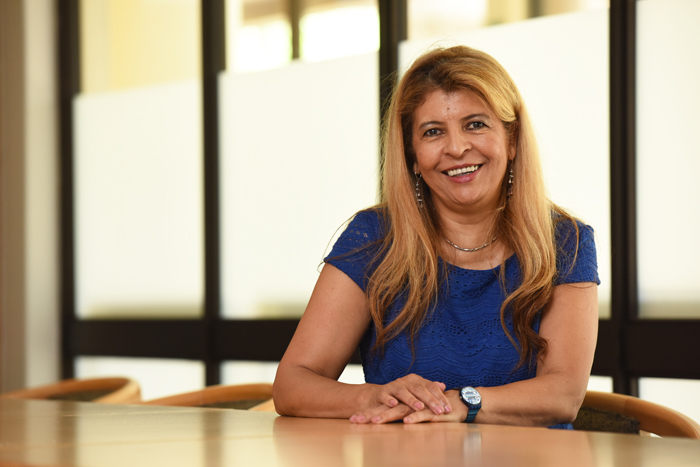New dean of law up for the challenge
05 February 2016 | Story Abigail Calata. Photo Michael Hammond.
Professor Penny Andrews, UCT's new dean of law, believes that all her experience has prepared her for a moment such as this and that the problems faced by higher education though difficult are not insurmountable. In fact she views these challenges as “great opportunities”.
Born in Cape Town, Andrews started her academic career in Australia after completing her LLM at Columbia University in New York. She had obtained her undergraduate degree from the then University of Natal.
She decided to further her education after her work at a legal aid clinic in Durban exposed her to the difficulties that people experienced in their everyday life.
“When I was doing my BA I knew I wanted to help people pursue their rights and justice, and with a law degree I could,” says Andrews, an activist in the global anti-apartheid movement.
When asked why she moved back home after almost 30 years abroad, she mentions her “total dedication to South Africa and what happens here”.
“I also realised that I am really committed to mentoring the next generation of legal professionals, particularly black South African legal professionals,” she says.
Originally from Kensington in Cape Town, Andrews says: “If you were born in South Africa during apartheid your life's work is set out for you. For me the personal and professional is completely interlinked.
“I feel that all the work I've done thus far has contributed towards this moment, which is a difficult moment, but the problems we face are not insurmountable. It just requires commitment and hard work, and I'm no stranger to either. I feel prepared.”
Student-centred
For her the academic project must revolve around the student. “It is always about the students. When I'm confronting an issue or process, my question is always how does this affect the student?
“Teachers are not there to spoon feed their students, but some people must crawl before they can walk, before they can run. We, as teachers, need to figure out a way to reach our students, so they feel as if we care about their professional development and their learning.”
Another crucial element is a constant engagement between law scholars and practitioners. It was while studying in New York that she began to fully appreciate “the capacity and power of lawyers (and law scholars) to change the world”.
“In South Africa we are probably among the most fortunate of citizenry because we have a Constitution, which is such an important template for the values we need to reinforce in this society. Lawyers are best equipped to ensure that the Constitution becomes real – that the transformative vision of the Constitution actualises and makes a difference in people's lives.”
Andrews promotes such engagement through her involvement in the South African Reading Group, an interdisciplinary group whose members share an interest in ongoing developments in South Africa. She and Professor Stephen Ellman of New York Law School founded the group in 1994.
The group would host conferences and talks featuring prominent South African legal thinkers like Richard Goldstone, Albie Sachs, Yvonne Mokgoro and Emeritus Professor Thandabantu Nhlapo among others.
The power of humour
Andrews enjoys her work immensely. As a young professor she couldn't believe her luck in being paid to do what she loves.
“Every year I had a new class of young, inquiring smart people with whom I engaged regularly. I could write about whatever I wanted to write and then there were the long holidays … Now as dean I'm involved in something larger than myself – in institutional culture change, mentoring and development.”
Her sense of humour helps her cope in difficult times. “In many communities, but particularly the Cape coloured community, humour is very important because it is a coping mechanism. We're not laughing at, but laughing with people. We've got to able to laugh at ourselves,” she concludes.
 This work is licensed under a Creative Commons Attribution-NoDerivatives 4.0 International License.
This work is licensed under a Creative Commons Attribution-NoDerivatives 4.0 International License.
Please view the republishing articles page for more information.










